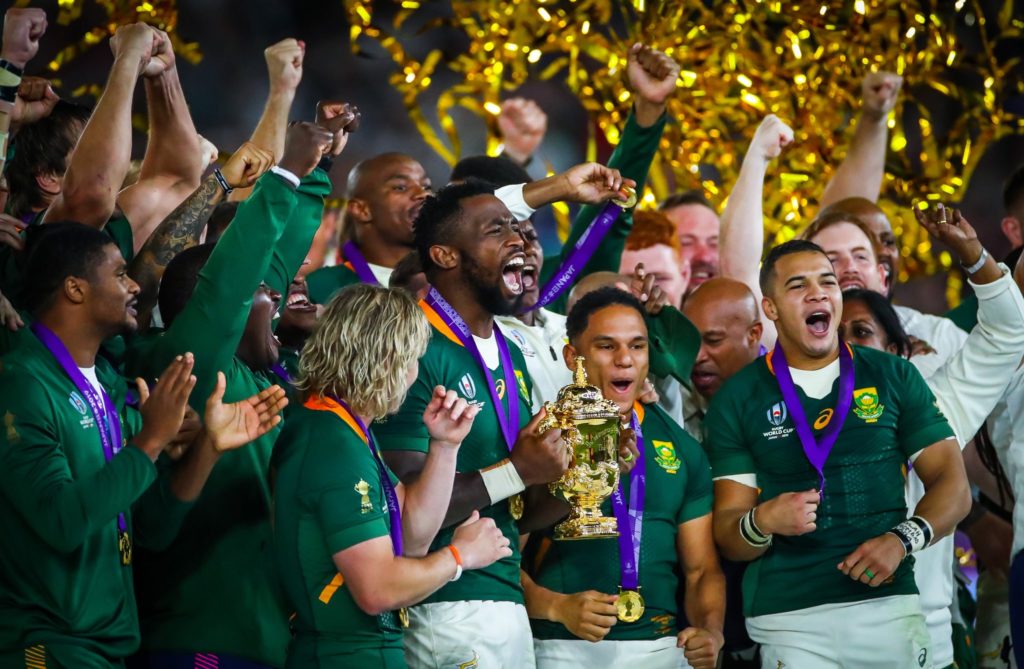Rassie Erasmus’ team has given the world a reason to respect the Springboks once more, writes JON CARDINELLI in SA Rugby magazine.
New issue: How the Boks united a nation
Two years ago, I was sitting at the Springboks’ plush team hotel in Dublin. An Irish journalist had cornered me and was asking about South African rugby’s fall from grace.
Myriad problems were afflicting the local game. The writer asked me about the backward administration as well as the exodus of players to Europe. He wanted to know why outgoing Munster coach Rassie Erasmus wasn’t working with head coach Allister Coetzee while both were in Dublin, and why two assistant coaches in Johann van Graan and Brendan Venter were being released mid-tour.
The Boks went on to lose to Ireland by a record score. They ended 2017 with yet another disappointing loss to Wales. At that point, most were in agreement that a struggling South African side was unlikely to advance beyond the quarter-finals of the 2019 World Cup.
As fate would have it, I caught up with the same writer in the lead-up to the World Cup final in Yokohama. On this occasion, he wanted to know how Erasmus and captain Siya Kolisi had turned the team around.
He asked me about the impressive structures, the team’s status as title contenders as well as the group’s inclusive and transformed culture. The line of questioning was a statement in itself. It spoke volumes for how far this Bok team has come in a two-year period and how it is viewed by the international rugby community.
The Boks were one of the most engaging teams at the World Cup. They embraced the Japanese people from the outset and quickly earned their respect. The honesty and transparency that marked their campaign was apparent even when they were dealing with difficult questions around doping in South Africa and the Eben Etzebeth saga. There was a confidence and certainty in the manner of the coaches and players that wasn’t there before 2018.
What was also plain to see – and especially through the eyes of foreign journalists, opposition coaches, players and fans – was that the Boks had regained what they lost in 2017. Call it an aura, a reputation or even a sense of identity, the Springbok team at this World Cup was a side to be respected and feared.
By the end of the tournament the forwards were being spoken about in reverent tones. ‘They’re bloody big buggers, aren’t they?’ Prince Charles remarked ahead of the semi-final clash with Wales. Warren Gatland marvelled at the Boks’ physicality and staying power. Suddenly they were being criticised for how they won matches instead of being slammed for not winning matches at all.
South African rugby should continue to grow. For the first time in history, the Bok group will remain intact after a World Cup and will have an opportunity to build on what they have already achieved, rather than start from scratch.
Erasmus will be heavily involved with the team strategy over the next four years while the likes of Jacques Nienaber will assume more responsibility in the Bok coaching set-up. One would expect the Boks to develop their game further ahead of the series against the British & Irish Lions in 2021 and the World Cup in 2023.
For all that they have achieved over the past two years, this Bok team have yet to realise their full potential. They will lose a couple of players to retirement over the next few years but the vast majority of the squad should still be around in the lead-up to 2023.
They will grow under an ambitious coaching staff during that period and it isn’t arrogant to suggest that they will go on to surpass the great sides of 2007 and 2009.
*This article originally appeared in the December issue of SA Rugby magazine, on sale now!
Photo: Getty Images





